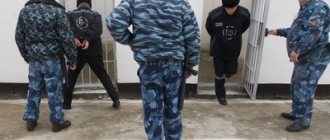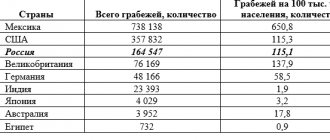Criminal Code of the Russian Federation in the latest edition:
Article 127 of the Criminal Code of the Russian Federation. Unlawful imprisonment
1. Illegal deprivation of a person’s liberty, not related to his abduction, -
shall be punishable by restriction of freedom for a term of up to two years, or forced labor for a term of up to two years, or arrest for a term of three to six months, or imprisonment for a term of up to two years.
2. The same act committed:
a) by a group of persons by prior conspiracy;
b) has become invalid. — Federal Law of December 8, 2003 N 162-FZ;
c) with the use of violence dangerous to life or health;
d) using weapons or objects used as weapons;
e) in relation to a known minor;
f) in relation to a woman who is known to the perpetrator to be pregnant;
g) in relation to two or more persons, -
shall be punishable by forced labor for a term of up to five years or imprisonment for a term of three to five years.
3. Acts provided for in parts one or two of this article, if they were committed by an organized group or caused by negligence the death of the victim or other grave consequences, -
shall be punished by imprisonment for a term of four to eight years.
Return to the table of contents of the document: Criminal Code of the Russian Federation in the latest edition
Crime concept
Completeness of the crime
The crime has a formal composition. Once the attacker deprives the victim of freedom of movement, the crime is considered to be committed, regardless of where she is detained or how long it happened. Deprivation of liberty does not always mean tying the victim up or tying him to an object. It may be locked indoors.
Unlawful restraint of freedom is the forcible detention of a person in any place. The attacker's goal is to deprive the victim of freedom of movement. This is done on the basis of personal motives, but without the purpose of obtaining a ransom or material gain.
The attacker achieves his goal in the following ways:
- misrepresentation (read more here);
- physical impact;
- psychological impact;
- exposure to the use of psychotropic and narcotic substances.
Exposure may or may not pose a threat to human life and health. The punishment for the crime depends on this, among other things.
A victim is any individual, including minors.
Restriction of the victim’s freedom can be committed anywhere, for example:
- the place of permanent residence of the victim or attacker;
- at the place of work;
- in any establishment or institution;
- in any buildings or structures, including emergency, unfinished, etc.
Corpus delicti
The object of the crime is relations in society in terms of protecting the honor and dignity of the individual, as well as freedom of movement. The objective side is the presence of active actions aimed at restricting the freedom of the victim. Moreover, the objective side has a mandatory characteristic - the absence of signs of kidnapping
The subject of the crime is a legally capable individual at least sixteen years of age. The subjective side of the crime is necessarily characterized by direct intent. This means that if the purpose of the crime was not deprivation of liberty, but, for example, the seizure of the victim’s property, then the crime is classified under a different article.
Punishment
According to Article 127 of the Criminal Code of the Russian Federation, unlawful deprivation of liberty, which does not have signs of kidnapping, is punishable by:
note
In judicial practice, there is a practice of deprivation of liberty in the form of illegal placement in a psychiatric hospital. As a rule, attackers do this for selfish purposes - in this way they “softly eliminate” the victim and take possession of his property. You can read more details in this article.
- restriction of freedom for two years;
- forced labor for a period of two years;
- arrest ranging from three to 6 months;
- imprisonment within two years.
A more severe punishment is provided for such a crime, namely forced labor or imprisonment for up to five years, if it was committed:
- by several persons on the basis of a preliminary conspiracy;
- with violence that posed a danger to the life and health of the victim;
- using weapons or other objects that can be used as weapons;
- in relation to a child, a pregnant woman (if the perpetrator knew about it) or two or more persons.
If, as a result of an illegal restriction of freedom of movement, the death of the victim occurs, then the perpetrator faces imprisonment for a term of 4 to 8 years.
Unlawful deprivation of liberty: concept, signs, responsibility.
The object of the crime is personal freedom.
The objective side of the crime is expressed in the commission of actions consisting of a real deprivation or restriction of the personal freedom of the victim, not related to his movement.
The subject of the crime is general: a sane individual who has reached the age of 16.
The subjective side is characterized by direct intent.
2. Qualifying signs of unlawful deprivation of liberty and liability
Illegal deprivation of a person's freedom, not related to his abduction, is punishable by restriction of freedom for a term of up to two years, or forced labor for a term of up to two years, or arrest for a term of three to six months, or imprisonment for a term of up to two years.
In accordance with part 2, 3 art. 127 of the Criminal Code of the Russian Federation there are the following qualifying signs of committing this crime:
– by a group of persons by prior conspiracy;
– with the use of violence dangerous to life or health;
– using weapons or objects used as weapons;
– in relation to a known minor;
– in relation to a woman who is known to the perpetrator to be pregnant;
– in relation to two or more persons.
Committing these actions is punishable by forced labor for a term of up to five years or imprisonment for a term of three to five years.
If these actions were committed by an organized group or negligently resulted in the death of the victim or other grave consequences, then the punishment will be forced labor for up to five years or imprisonment for a term of three to five years.
It should also be noted that a crime can be committed by an official while performing his duties, in which case, in accordance with Art. 286 of the Criminal Code of the Russian Federation, the commission by an official of actions entailing a violation of the rights and legitimate interests of citizens is punishable by a fine in the amount of up to 800,000 rubles or in the amount of wages or other income of the convicted person for a period of up to six months, or by deprivation of the right to hold certain positions or engage in certain activities for a term of up to five years, or forced labor for a term of up to four years, or arrest for a term of four to six months, or imprisonment for a term of up to four years.
3. Related crimes
Illegal deprivation of liberty is related to kidnapping (Article 126 of the Criminal Code of the Russian Federation), the main distinguishing feature of which is the movement of the abducted person, which is expressed in a deliberate change in the location of the victim (the law does not establish the distance to which it is necessary to move the victim, but the victim must be moved to a place determined by the thief, for example in another house, basement, garage).
Related to illegal deprivation of liberty is illegal placement in a psychiatric hospital (Article 128 of the Criminal Code of the Russian Federation), the distinctive features of which are the transfer of a person to a psychiatric hospital by a special subject - a person whose job responsibilities include hospitalization and/or making a decision on hospitalization. The object of these crimes is personal freedom.
Seizure (a deliberate action expressed in suppressing the will of the victim and restricting his freedom of movement, in contrast to detainment; seizure is a short-term action necessary for movement and/or retention) or detainment (expressed in a violent, non-hazardous to life and health, restriction of freedom, deprivation of freedom of movement (tying up, locking in a room) of a person as a hostage (Article 206 of the Criminal Code of the Russian Federation) are also associated with unlawful deprivation of liberty, however, this crime is committed in order to force the state, organization or citizen to perform any action or abstain from committing any
actions as conditions for the release of the hostage. The main object of the crime is public safety.
Related can also be considered:
– illegal detention, detention or detention (Article 301 of the Criminal Code of the Russian Federation), the main feature of this crime is knowledge, as well as the presence of a special subject. In the absence of an officer authorized to lawfully take custody, such an action will be qualified under Art. 127 of the Criminal Code of the Russian Federation;
– issuing a knowingly unjust sentence, decision or other judicial act (Article 305 of the Criminal Code of the Russian Federation), the main feature of this crime is knowledge, as well as the presence of a special subject.
The object of these crimes is social relations that ensure the normal functioning of the court and law enforcement agencies.
Difference from similar crimes
A crime similar in composition is kidnapping (in other words, kidnapping), the penalties for which are provided for in Art. 126 of the Criminal Code of the Russian Federation. The main difference is that in a kidnapping the victim is necessarily forcibly removed. Kidnapping can be for selfish, material purposes, or based on personal motives.
Partially similar in composition, but with a more severe punishment, is the crime provided for in Art. 206 of the Criminal Code of the Russian Federation - hostage taking. It involves not only the unlawful deprivation of liberty of individuals, but also the compulsion of the state, organization or person to fulfill the demands of the kidnapper. Hostage taking almost always occurs with the use of force, weapons and is dangerous to the life and health of the victims.
By the way, what is the difference between hostage taking and kidnapping, we will tell you in this article https://lexconsult.online/6839-uderzhanie-v-zalozhnikah-sostav-otvetstvennost-stati-uk-rf
An illustration of illegal imprisonment in the video below:
Comments on Article 127 of the Criminal Code of the Russian Federation
Unlike kidnapping (Article 126 of the Criminal Code of the Russian Federation), in case of unlawful deprivation of liberty, the victim is not captured, not taken from his environment, not abducted, but remains in place, but is limited in movement.
Object of crime . The immediate object of the crime is the physical freedom of a specific victim(s).
An additional object may be the safety of life, health of the victim, his relatives, property relations, etc.
The objective side of the crime is characterized by actions to deprive the victim of the opportunity to freely, of his own free will, move in space and determine his place of stay.
Deprivation of freedom of movement does not necessarily imply complete immobilization (tying up) of the victim; as a result of committing a crime, the latter may retain the ability to move, but in a limited area controlled by the offender (for example, within a guarded dacha, other premises or area of the area).
A distinctive feature of unlawful deprivation of liberty from kidnapping is the absence of movement , i.e. a person is kept in the place where he was of his own free will.
The actions of a guilty person who has kidnapped a person and illegally detained him are qualified under Art. 126 of the Criminal Code of the Russian Federation and additional qualifications under Art. 127 of the Criminal Code of the Russian Federation is not required. The victim is illegally, forcibly, against his will, held in the place where he himself was voluntarily before , he is deprived of the opportunity to move at his own discretion, to communicate with other people. For example, a person is locked in his own house, apartment, office, closet, basement, etc.; tied up and kept in any room; left without life-saving equipment on the island so that he cannot leave it on his own, etc.
In the case where the guilty person, who initially illegally deprived a person of his freedom, subsequently moved the victim to another place, the act is qualified under the relevant part of Article 126 of the Criminal Code of the Russian Federation without additional qualification under Article 127 of the Criminal Code of the Russian Federation (clause 4 of the Resolution of the Plenum of the Supreme Court of the Russian Federation dated December 24. 2019 N 58 “On judicial practice in cases of kidnapping, unlawful imprisonment and human trafficking”).
The threat of murder or infliction of grievous bodily harm during unlawful deprivation of liberty should be qualified according to the totality of crimes provided for in the relevant part of Article 127 of the Criminal Code of the Russian Federation and Article 119 of the Criminal Code of the Russian Federation (clause 5 of the Resolution of the Plenum of the Supreme Court of the Russian Federation of December 24, 2019 N 58).
The elements of the crime are formal, the crime is considered completed from the moment of actual deprivation of liberty, regardless of the duration of the victim’s detention (in this case, it is necessary to take into account the provisions of Part 2 of Article 14 of the Criminal Code of the Russian Federation, which can be applied in the case of short-term deprivation of liberty).
If a person is deprived of his liberty with his consent, but is subsequently detained against his will, then the perpetrator must be held liable for unlawful deprivation of liberty.
In the case of legal deprivation of liberty (for example, a minor based on his interests; with the consent of the victim; as a measure of state coercion, etc.) criminal liability under Art. 127 of the Criminal Code of the Russian Federation is excluded.
An example from judicial practice
Citizen Petrov, after a quarrel with his wife with accusations of treason, locked her in his own apartment. He took the keys to the front door and his personal mobile phone. Petrov turned off his landline phone. The victim was locked up for one month and was able to leave the apartment only after a visit from the local police officer. He appeared after a statement from neighbors who heard screams for help from the apartment.
During the investigation, it was also found out that the victim was tied to the radiator while Petrov was away from home. Petrov was found guilty by the court of committing a crime in accordance with Part 1 of Art. 127 of the Criminal Code of the Russian Federation and sentenced to forced labor for a period of two years.
If you have any questions about the topic of the article, ask them in the comments
Judicial practice: sentences and punishment under Art. 127 of the Criminal Code of the Russian Federation
- Decision of the Supreme Court: Determination N 203-APU17-21... THE SUPREME COURT OF THE RUSSIAN FEDERATION Case No. 203-APU17-21 APPEAL DECISION Moscow August 31, 2021 Judicial Collegium for Military Personnel of the Supreme...
- Decision of the Supreme Court: Resolution No. 310P13 dated... DECISION OF THE PRESIDIUM OF THE SUPREME COURT OF THE RUSSIAN FEDERATION Case No. 310-P13 Moscow January 23, 2014 Presidium of the Supreme Court of the Russian Federation...
- Judicial Collegium for Criminal Cases, appeal:... THE SUPREME COURT OF THE RUSSIAN FEDERATION Case No. 72-APU 17-21 APPEAL DECISION Moscow October 04, 2021 Judicial Collegium for Criminal Cases...
- Resolution of the Plenum of the Supreme Court of the Russian Federation dated... PLENARY OF THE SUPREME COURT OF THE RUSSIAN FEDERATION DECISION dated December 27, 2002 N 29 ON JUDICIAL PRACTICE IN CASES OF THEFT,...
- Ruling of the ECtHR dated 02/14/2017 EUROPEAN COURT OF HUMAN RIGHTS THIRD SECTION CASE “MASLOVA VS. RUSSIAN FEDERATION” (Complaint No. 15980/12) JUDGMENT…
- Resolution of the Presidium of the Supreme Court of the Russian Federation dated... PRESIDIUM OF THE SUPREME COURT OF THE RUSSIAN FEDERATION DECISION dated December 5, 2018 N 126-P18 ON RESUMING PROCEEDINGS IN THE CASE DUE TO NEW...
- Resolution of the Plenum of the Supreme Court of the Russian Federation dated... PLENARY OF THE SUPREME COURT OF THE RUSSIAN FEDERATION DECISION of November 15, 2021 N 48 ON THE PRACTICE OF APPLICATION BY COURTS OF LEGISLATION GOVERNING FEATURES...
- Decision of the Supreme Court: Determination No. 38-АПУ17-2 dated... THE SUPREME COURT OF THE RUSSIAN FEDERATION No. 38-АПУ17-2 APPEAL DECISION Moscow March 1, 2021 Judicial Collegium for Criminal Cases of the Supreme Court...
- Resolution of the Plenum of the Supreme Court of the Russian Federation dated... PLENAUM OF THE SUPREME COURT OF THE RUSSIAN FEDERATION DECISION dated June 25, 2021 N 18 ON JUDICIAL PRACTICE IN CASES OF CRIMES,...
- Resolution of the Plenum of the Supreme Court of the Russian Federation dated... PLENAUM OF THE SUPREME COURT OF THE RUSSIAN FEDERATION DECISION dated December 17, 2021 N 43 ON SOME ISSUES OF JUDICIAL PRACTICE IN CASES...






